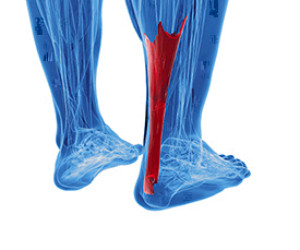Causes of Achilles Tendonitis

One of the most common causes of heel pain is Achilles tendonitis. This condition is thought to be an overuse injury that affects the Achilles tendon, which connects the muscles of the calf with the heel. The Achilles tendon is made up of thousands of collagen fibers that are tightly packed, to make up the longest and strongest tendon in the body. In most cases, injury to the Achilles tendon occurs gradually, often from not resting long enough between bouts of exercise. Achilles tendonitis can also be the result of what is called overload, which can occur if you increase the length or intensity of a run. Such an injury can also be caused by suddenly switching from shoes with a heel to flats for walking or running. Treatment options include rest, strength and stretching exercises, and certain medications. An injured Achilles tendon can take a long time to heal, but rushing back into activity can cause a chronic condition to develop. A chiropodist can examine your Achilles tendon to determine both the cause and severity of the injury, along with a suggested treatment program.
Achilles tendonitis is a common injury of the Achilles tendon, a band of fibrous tissue that runs along the back of the lower leg. The Achilles tendon can also rupture, making it impossible to lift the foot. If you are suffering from heel or calf pain, please consult with one of the specialists from Thornhill Foot Clinic. Our chiropodists can help you maintain the health of your lower limbs and your mobility.
Causes of Achilles tendon injuries include:
Repetitive stress or overuse
Sudden increase in activity levels
High impact injury
Calf muscle tightness or weakness
Altered foot biomechanics
Heel bone spurs
Underlying medical conditions that weaken the tendon
Symptoms of an Achilles tendon injury include:
Heel and calf pain that worsens following exercise
Chronic heel and calf pain
Sudden pain in the back of the ankle or calf
A popping or snapping sensation
Thickened lump in the Achilles tendon
Ankle and calf stiffness
Decreased range of motion in the affected foot
Swelling
Difficulty walking
Treatment
Resting the affected leg
Applying ice
Compressing the foot and ankle
Elevating the injured leg
Wearing orthotics
Low impact exercises
Stretches
Strengthening exercises
Non-steroidal anti-inflammatory medications
Cortisone injections
Surgery, if the tendon is ruptured
Achilles tendon injuries can be very painful and lead to reduced mobility if left untreated. If you have any questions, please feel free to contact our office located in . We offer the newest diagnostic and treatment technologies for all your foot care needs.
